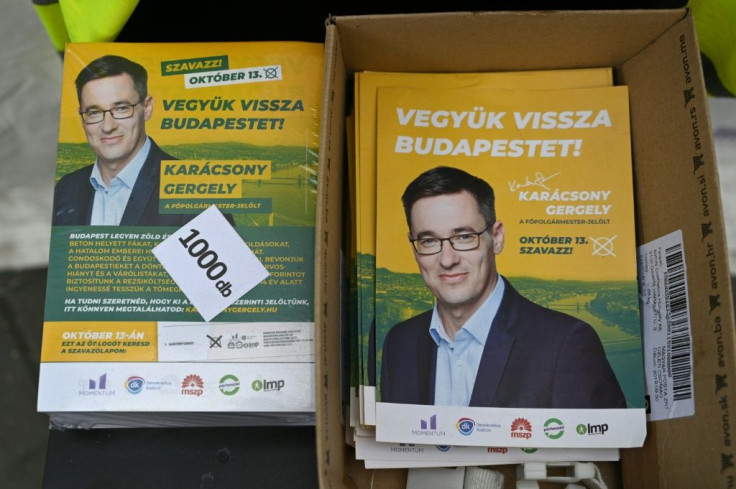Hungary Anti-Orban Opposition Unites For 'High-stakes' Vote

Opposition parties in Hungary have moved to cooperate in municipal elections this weekend in an attempt to roll back the power of nationalist Prime Minister Viktor Orban.
The country's previously fragmented opposition has united on a large scale for Sunday's polls, potentially denying Orban's Fidesz party landslide election wins for the first time since 2006.
Opposition leaders in the EU nation of 9.8 million people say they hope they can replicate what happened in Istanbul in June when opposition mayor Ekrem Imamoglu defeated the candidate from the party of Turkey's strongman leader Recep Erdogan.
After sweeping to power in 2010, Orban overhauled election rules, making it more difficult for opposition parties to stand any chance against Fidesz.
As a result, the opposition has been consecutively routed at parliamentary, European and local elections despite around half of the electorate often voting for anti-Orban parties.
Now, in many municipalities just one opposition challenger is lining up.
"Parties finally realised that cooperation is the only way to achieve success," said Gergely Karacsony, a Budapest district head who is running for mayor against Orban ally and incumbent Istvan Tarlos.
Tight races
The main battleground is the capital, which saw sizeable anti-government protests earlier this year and where Karacsony, 44, is almost neck-and-neck in polling with Tarlos, 71, who like Orban has been in office since 2010.
"Winning back the capital can prise open a crack in Viktor Orban's system," said Karacsony.
Tight races are also expected in a string of larger currently Fidesz-run cities like Miskolc and Pecs, as well as in most of Budapest's 23 municipalities.
Long-running efforts to weave unity among previously feuding leftist parties have frayed in places, however, with several wrangles over candidate selection.
The once far-right Jobbik party has also sat uneasily in the cross-party alliance, offering Karacsony only lukewarm support and opting out of cooperation in several municipalities.
But the mild-mannered former academic insists that the project has largely worked and is ready to be tested at the ballot box.
And he has drawn parallels with the Istanbul vote which came as a huge blow to Erdogan who once said that winning the city was like winning all of Turkey.
"Istanbul voted against an aggressive illiberal power in many ways similar to Orban's regime," said Karacsony after visiting Imamoglu in August.
Relentless attacks
Pro-government media has relentlessly attacked Karacsony, who failed to get close to Orban as an opposition prime ministerial candidate at last year's parliamentary election.
One news portal published articles describing him as "unsuitable" 167 times in one week, he has claimed.
Several of his news conferences have been disrupted by pro-Fidesz activists blaring circus music from loudspeakers.
In a secret recording of a closed-doors party meeting leaked to pro-government media he was also heard blasting allies in the Socialist party over alleged corruption.
The bruising campaign has also seen tactics like sex tapes and police raids used against opposition politicians for the first time.
For Andras Piko, 54, the opposition candidate in Budapest's tough inner-city eighth district, a raid on his campaign office was a sign that Fidesz are rattled.
"That hasn't happened since the fall of communism," Piko, a jovial bearded radio presenter, told AFP in the office at the back of a run-down building.
"It shows that we are in the boxing ring at least," he said, amid stacks of election posters.
During the raid Piko's campaign office laptops were confiscated following a report in a pro-Orban newspaper alleging that his team was misusing voter data.
The investigation was later dropped due to lack of evidence, but not before the raid was publicised across the swathes of pro-Orban media organs.
A solidarity rally soon after drew speakers from across the political spectrum.
'High stakes'
"The opposition has never been as united," said Piko, who quit his job in June after he was sought by parties to run for election.
"The stakes are high. If it can make gains, the opposition can build a power-base and get access to resources. If it shows it can govern, it can then mount a serious challenge to Orban (at the next scheduled parliamentary election) in 2022," he said.
Despite the optimism though, observers still downplay opposition hopes of a turning-point breakthrough.
Fidesz remains dominant in the provinces, particularly in smaller localities, Andrea Virag, a political analyst with the Republikon think-tank in Budapest, told AFP.
"The opposition can probably be satisfied if Karacsony takes Budapest, and it wins at least four of five of the main cities," she said.
© Copyright AFP 2024. All rights reserved.





















